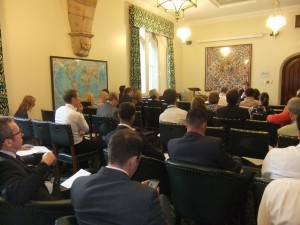On Tuesday 6th September, the APPG for Education hosted Sir David Carter, the National Schools Commissioner. Sir David provided the Group with his thoughts on the development of academies policy and an update on the work of Regional Schools Commissioners.
Sir David began by describing his 32 years in schools, as a music teacher, headteacher, Principal of John Cabot City Technology College, and CEO of the Cabot Learning Federation. He described in particular the educational inequality evident in the system during his time as headteacher, which provided the stimulus for the creation of the Cabot Learning Federation. Sir David concluded his opening remarks by outlining the three most important drivers of improvement in school: great teaching, the quality of leadership, and collaboration, before opening the floor to questions.

Danny Kinahan MP, Chair of the APPG for Education, with Sir David Carter, National Schools Commissioner
In response to a question on the strategic role of larger MATs, Sir David Carter said that, as National Schools Commissioner, he had brought in oversight of larger trusts. He said that the strategic role of larger MATs was to build in system capacity. Danny Kinahan MP, Chair of the APPG for Education, asked about training teachers for leadership. Sir David expressed his belief that leadership development in schools is now better than at any time in the past. The challenge is to incentivise the best leaders to work in the most challenging areas where their skills are most needed.
Greg Watson from GL Assessment shared his observations on the barriers to growth for smaller MATs, highlighting a lack of skills, poor visibility and transparency of opportunities to grow, and the perception of risk in taking on failing schools. He asked how the National Schools Commissioner could help smaller trusts to overcome these barriers. Sir David said that he expected more leadership talent to enter the system from outside the teaching sector in the future. On visibility and transparency, Sir David described the Regional Schools Commissioners’ role in building networks and stressed the importance of building capacity ahead of need.
Nic Dakin MP asked how, practically, the academies system would help schools in his constituency of Scunthorpe. Sir David explained that the central purpose of the system was to improve failing or underperforming schools. The success of the system will be judged not only on whether it can improve schools, but also on how well it prevents those schools from slipping back. Sir David also expressed his hope that the academies system would drive a shift away from school-by-school accountability to a more systemic accountability model.
In response to a question about accountability and parental engagement from Michelle Wildman of PTA UK, Sir David said that every parent should be able to hold the school their child attends to account but that being a parent governor was not the only way to do this. He also related his own experience of meeting parent groups as National Schools Commissioner. Sir David also fielded a question on industry support for academies from Caroline Wright of BESA. He said that industry has an important role in sharing skills and expertise and participating in academy boards.
Laura-Jane Rawlings from Youth Employment UK said that there was an expectation that academies would facilitate a move toward more holistic learning, which has so far not materialised. She asked what the National School Commissioner could do to support a proliferation of more holistic learning. Sir David said that there is still work to be done in that area but gave some examples of what is currently happening. He also stated his belief that academies do have greater capacity to deliver a more holistic learning experience.
Steven Abrahams from Groupcall asked Sir David to expand on an earlier comment about the richness of data available in the current system. Sir David said that there is more data available now than ever before and schools and teachers are better at analysing that data. The challenge is to make sure that teachers are using that data insight to best effect.
Patrick Hayes from BESA relayed some findings from research carried out by a member organisation that found very negative impressions of multi academy trusts amongst teachers and asked how MATs will win over the profession. Sir David said that there is a suspicion that MATs are a vehicle for business but that this will be assuaged as more teachers work in MATs and experience the way they operate first hand.
Steve McCabe MP asked about the justification for single-academy trusts if the system is centred on the benefits of synergy and collaboration. Sir David said that questions have to be asked about the educational viability of single academies if they don’t have access to a wider pool of resources. He did however say that he understood the necessity of single-academy trusts in rural settings and explained that it is possible for them to provide a good quality of education.
Danny Kinahan MP finished with a question about early years provision, before thanking Sir David and those who participated in the Q&A.

